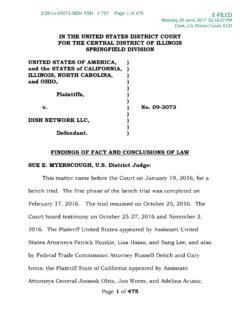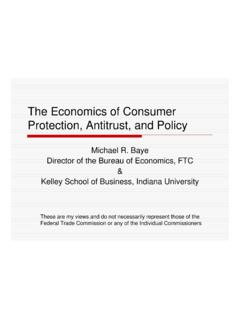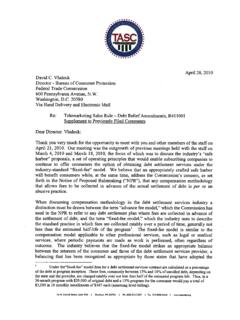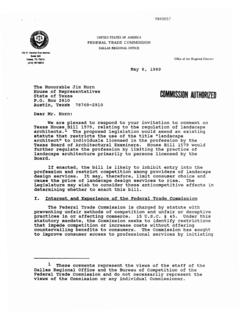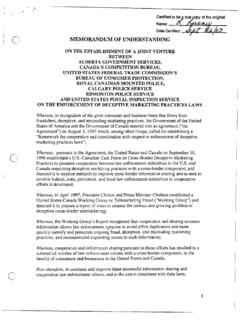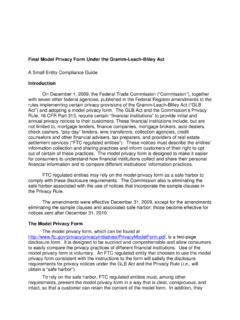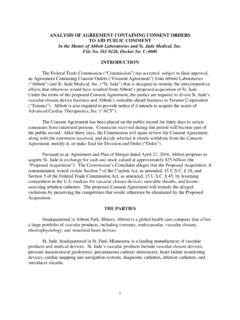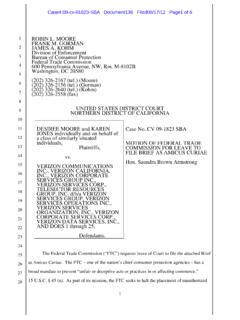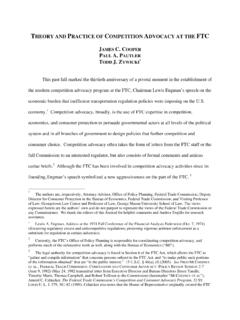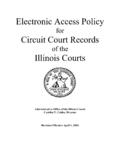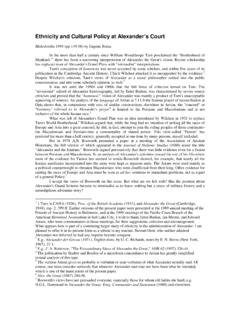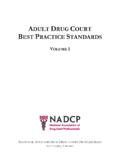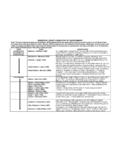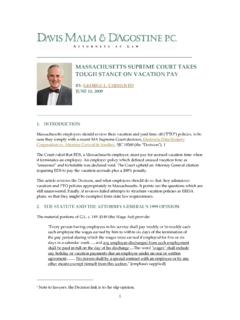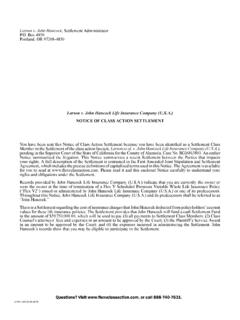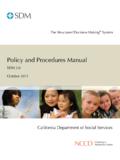Transcription of FTC Staff Guidance on Active Supervision of State ...
1 FTC Staff Guidance on Active Supervision of State Regulatory Boards Controlled by Market Participants . I. Introduction States craft regulatory policy through a variety of actors, including State legislatures, courts, agencies, and regulatory boards. While most regulatory actions taken by State actors will not implicate antitrust concerns, some will. Notably, states have created a large number of regulatory boards with the authority to determine who may engage in an occupation ( , by issuing or withholding a license), and also to set the rules and regulations governing that occupation. Licensing, once limited to a few learned professions such as doctors and lawyers, is now required for over 800 occupations including (in some states) locksmiths, beekeepers, auctioneers, interior designers, fortune tellers, tour guides, and shampooers. 1. In general, a State may avoid all conflict with the federal antitrust laws by creating regulatory boards that serve only in an advisory capacity, or by staffing a regulatory board exclusively with persons who have no financial interest in the occupation that is being regulated.
2 However, across the United States, licensing boards are largely dominated by Active members of their respective industries .. 2 That is, doctors commonly regulate doctors, beekeepers commonly regulate beekeepers, and tour guides commonly regulate tour guides. Earlier this year, the Supreme Court upheld the Federal Trade Commission's determination that the North Carolina State Board of Dental Examiners ( NC Board ) violated the federal antitrust laws by preventing non-dentists from providing teeth whitening services in competition with the State 's licensed dentists. State Bd. of Dental Exam'rs v. FTC, 135 S. Ct. 1101 (2015). NC Board is a State agency established under North Carolina law and charged with administering and enforcing a licensing system for dentists. A majority of the members of this State agency are themselves practicing dentists, and thus they have a private incentive to limit . This document sets out the views of the Staff of the Bureau of Competition.
3 The Federal Trade Commission is not bound by this Staff Guidance and reserves the right to rescind it at a later date. In addition, FTC Staff reserves the right to reconsider the views expressed herein, and to modify, rescind, or revoke this Staff Guidance if such action would be in the public interest. 1. Aaron Edlin & Rebecca Haw, Cartels By Another Name: Should Licensed Occupations Face Antitrust Scrutiny, 162. U. PA. L. REV. 1093, 1096 (2014). 2. Id. at 1095. October 2015 1. competition from non-dentist providers of teeth whitening services. NC Board argued that, because it is a State agency, it is exempt from liability under the federal antitrust laws. That is, the NC Board sought to invoke what is commonly referred to as the State action exemption or the State action defense. The Supreme Court rejected this contention and affirmed the FTC's finding of antitrust liability. In this decision, the Supreme Court clarified the applicability of the antitrust State action defense to State regulatory boards controlled by market participants: The Court holds today that a State board on which a controlling number of decisionmakers are Active market participants in the occupation the board regulates must satisfy Midcal's [Cal.]
4 Retail Liquor Dealers Ass'n v. Midcal Aluminum, Inc., 445 97 (1980)] Active Supervision requirement in order to invoke State -action antitrust immunity. Dental, 135 S. Ct. at 1114. In the wake of this Supreme Court decision, State officials have requested advice from the Federal Trade Commission regarding antitrust compliance for State boards responsible for regulating occupations. This outline provides FTC Staff Guidance on two questions. First, when does a State regulatory board require Active Supervision in order to invoke the State action defense? Second, what factors are relevant to determining whether the Active Supervision requirement is satisfied? Our answers to these questions come with the following caveats. Vigorous competition among sellers in an open marketplace generally provides consumers with important benefits, including lower prices, higher quality services, greater access to services, and increased innovation.
5 For this reason, a State legislature should empower a regulatory board to restrict competition only when necessary to protect against a credible risk of harm, such as health and safety risks to consumers. The Federal Trade Commission and its Staff have frequently advocated that states avoid unneeded and burdensome regulation of service providers. 3. Federal antitrust law does not require that a State legislature provide for Active Supervision of any State regulatory board. A State legislature may, and generally should, prefer that a regulatory board be subject to the requirements of the federal antitrust 3. See, , Fed. Trade Comm'n Staff policy Paper, policy Perspectives: Competition and the Regulation of Advanced Practice Registered Nurses (Mar. 2014), competition-regulation-advanced-practice - ; Fed. Trade Comm'n & Dept. of Justice, Comment before the South Carolina Supreme Court Concerning Proposed Guidelines for Residential and Commercial Real Estate Closings (Apr.)
6 2008), submit-letter-supreme-court-south-caroli na-proposed. October 2015 2. laws. If the State legislature determines that a regulatory board should be subject to antitrust oversight, then the State legislature need not provide for Active Supervision . Antitrust analysis including the applicability of the State action defense is fact-specific and context-dependent. The purpose of this document is to identify certain overarching legal principles governing when and how a State may provide Active Supervision for a regulatory board. We are not suggesting a mandatory or one-size-fits- all approach to Active Supervision . Instead, we urge each State regulatory board to consult with the Office of the Attorney General for its State for customized advice on how best to comply with the antitrust laws. This FTC Staff Guidance addresses only the Active Supervision prong of the State action defense. In order successfully to invoke the State action defense, a State regulatory board controlled by market participants must also satisfy the clear articulation prong, as described briefly in Section II.
7 Below. This document contains Guidance developed by the Staff of the Federal Trade Commission. Deviation from this Guidance does not necessarily mean that the State action defense is inapplicable, or that a violation of the antitrust laws has occurred. October 2015 3. II. Overview of the Antitrust State Action Defense Federal antitrust law is a central safeguard for the Nation's free market structures .. The antitrust laws declare a considered and decisive prohibition by the Federal Government of cartels, price fixing, and other combinations or practices that undermine the free market. Dental, 135 S. Ct. at 1109. Under principles of federalism, the States possess a significant measure of sovereignty. Dental, 135 S. Ct. at 1110 (quoting Community Communications Co. v. Boulder, 455 40, 53 (1982)). In enacting the antitrust laws, Congress did not intend to prevent the States from limiting competition in order to promote other goals that are valued by their citizens.
8 Thus, the Supreme Court has concluded that the federal antitrust laws do not reach anticompetitive conduct engaged in by a State that is acting in its sovereign capacity. Parker v. Brown, 317 341, 351-52 (1943). For example, a State legislature may impose restrictions on occupations, confer exclusive or shared rights to dominate a market, or otherwise limit competition to achieve public objectives. Dental, 135 S. Ct. at 1109. Are the actions of a State regulatory board, like the actions of a State legislature, exempt from the application of the federal antitrust laws? In North Carolina State Board of Dental Examiners, the Supreme Court reaffirmed that a State regulatory board is not the sovereign. Accordingly, a State regulatory board is not necessarily exempt from federal antitrust liability. More specifically, the Court determined that a State board on which a controlling number of decisionmakers are Active market participants in the occupation the board regulates may invoke the State action defense only when two requirements are satisfied: first, the challenged restraint must be clearly articulated and affirmatively expressed as State policy .
9 And second, the policy must be actively supervised by a State official (or State agency) that is not a participant in the market that is being regulated. Dental, 135 S. Ct. at 1114. The Supreme Court addressed the clear articulation requirement most recently in FTC v. Phoebe Putney Health Sys., Inc., 133 S. Ct. 1003 (2013). The clear articulation requirement is satisfied where the displacement of competition [is] the inherent, logical, or ordinary result of the exercise of authority delegated by the State legislature. In that scenario, the State must have foreseen and implicitly endorsed the anticompetitive effects as consistent with its policy goals. Id. at 1013. The State 's clear articulation of the intent to displace competition is not alone sufficient to trigger the State action exemption. The State legislature's clearly-articulated delegation of authority to a State regulatory board to displace competition may be defined at so high a level of generality as to leave open critical questions about how October 2015 4.
10 And to what extent the market should be regulated. There is then a danger that this delegated discretion will be used by Active market participants to pursue private interests in restraining trade, in lieu of implementing the State 's policy goals. Dental, 135 S. Ct. at 1112. The Active Supervision requirement seeks to avoid this harm by requiring the State to review and approve interstitial policies made by the entity claiming [antitrust]. immunity. Id. Where the State action defense does not apply, the actions of a State regulatory board controlled by Active market participants may be subject to antitrust scrutiny. Antitrust issues may arise where an unsupervised board takes actions that restrict market entry or restrain rivalry. The following are some scenarios that have raised antitrust concerns: A regulatory board controlled by dentists excludes non-dentists from competing with dentists in the provision of teeth whitening services.
